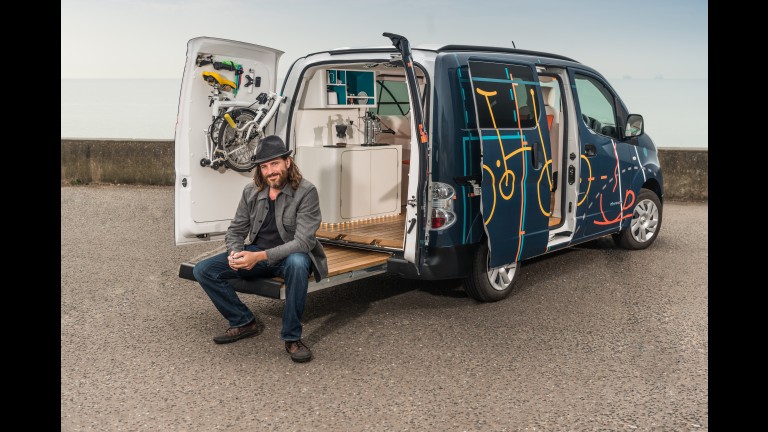Nissan’s zero-emission e-NV200 van has been converted into the world’s first all-electric mobile office, featuring all the mod coms.
UK-based design workshop Studio Hardie helped with the transformation. This professional office environment on wheels features an integrated fold-out desk, touchscreen computer, wireless internet, smartphone-controlled LED lights, wireless phone charging, Bluetooth audio system, mini fridge and barista-quality coffee machine.
The e-NV200 WORKSPACe concept paints a picture of what desk-based employment could look like in the future as hot-desking and flexible working grows in popularity across the globe. Moreover, the one-off vehicle also provides an example of Nissan’s Intelligent Mobility vision, and the company’s view of how the relationship between vehicles and people are changing.
During 2015, the number of co-working and hot-desking spaces worldwide increased by 36 per cent as small businesses and working professionals looked for increased mobility and a more cost-effective alternative to traditional city-centre office space.
Today, the average UK commuter already spends £358 on travelling to work each month, with London office space fetching £1619 per square metre annually, and estimated to rise a further 1.4 per cent over the next year.
With electric vehicles costing as little as £0.02 per mile to run, the e-NV200 WORKSPACe offers a cost-effective desk space solution allowing users to work for free in some city-centres that offer free EV charging bays, or escape the city altogether for the countryside or coastal fresh air.
“With property prices in our capital cities at such a premium and the modern professional needing to be ever more mobile, businesses will need to think smart and consider what the workplace of the future looks like,” Gareth Dunsmore, director of electric vehicles, Nissan Europe said. “With hot-desking and remote working on the rise, it is not too big a leap to see a future where our vehicles will become connected, energy efficient, mobile workspaces and the e-NV200 WORKSPACe project could become more than just a concept.”
The e-NV200 WORKSPACe can be rapid charged from empty to 80 percent power in just 30 minutes, and for those times when you want to leave the office parked and charging up, there’s an internal mount for a folding Brompton Bike, allowing users to make short trips around the city or complete the ‘last mile’ of any journey.
William Hardie, celebrated UK-based designer and founder of Studio Hardie, said: “We specialise in creating amazing spaces in unexpected places, but we’ve never done anything in an electric vehicle before. Given the van’s green credentials we wanted to maximise the space with smart and considered features such as sustainably sourced materials and efficiently-powered technology. We believe the future of technology is a return to quality craftsmanship, so we’ve also looked to hone an environment that professionals will really enjoy working in. All the comfort and connectivity of a modern office, with a few surprising touches thrown in!”
Despite developments in renewable energy, however, experts suggest it will take 50 years for electric cars to impact global oil demand in transport.
According to Dr Mamdouh G Salameh, professor of energy economics at the ESCP Europe Business School, the enabling technologies of renewable energy are not developed enough to properly impact consumption levels of oil in the transport sector.
Predictions of a post-oil era are also unlikely as in 2015, renewable energy accounted for only 2.8% per cent of the global primary energy consumption.
“There is no doubt that the future of energy lies within renewables, yet technologies such as electric cars are still relatively new and will take up to five decades to have a real impact on the global demand for oil in transport. Despite increasing appearances on the roads, the cars’ enabling technology is decades away from even impacting fuel demand, let alone replacing it entirely,” Salameh said.
The price collapse of 2014 demonstrated oil’s true impact on the global economy and the enormity of renewables’ task to replace it. From 2013 to 2015, Middle Eastern export revenues fell by $320 billion.
Could future electric car usage prompt a post-oil era? For Salameh, the answer is an emphatic ‘no’.
For businesses in the UK looking to take advantage of an all-electric mobile office, the Nissan e-NV200 WORKSPACe is an option, although its practicality and mass appeal remain to be seen.







